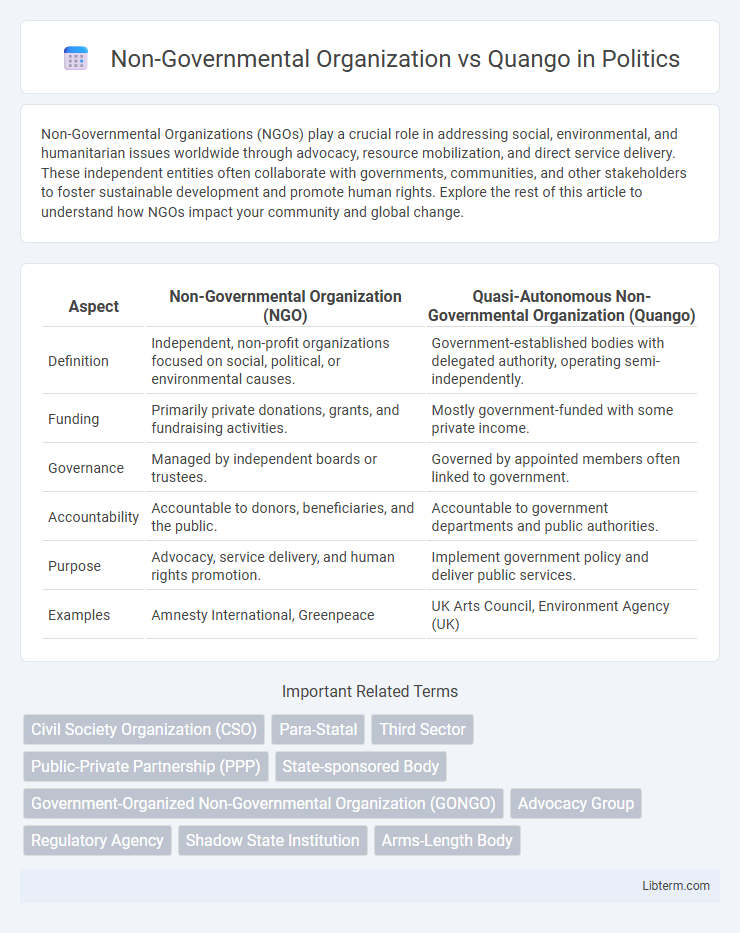Non-Governmental Organizations (NGOs) play a crucial role in addressing social, environmental, and humanitarian issues worldwide through advocacy, resource mobilization, and direct service delivery. These independent entities often collaborate with governments, communities, and other stakeholders to foster sustainable development and promote human rights. Explore the rest of this article to understand how NGOs impact your community and global change.
Table of Comparison
| Aspect | Non-Governmental Organization (NGO) | Quasi-Autonomous Non-Governmental Organization (Quango) |
|---|---|---|
| Definition | Independent, non-profit organizations focused on social, political, or environmental causes. | Government-established bodies with delegated authority, operating semi-independently. |
| Funding | Primarily private donations, grants, and fundraising activities. | Mostly government-funded with some private income. |
| Governance | Managed by independent boards or trustees. | Governed by appointed members often linked to government. |
| Accountability | Accountable to donors, beneficiaries, and the public. | Accountable to government departments and public authorities. |
| Purpose | Advocacy, service delivery, and human rights promotion. | Implement government policy and deliver public services. |
| Examples | Amnesty International, Greenpeace | UK Arts Council, Environment Agency (UK) |
Understanding Non-Governmental Organizations (NGOs)
Non-Governmental Organizations (NGOs) are independent entities that operate without direct government control, focusing on humanitarian, environmental, or social issues to promote public welfare. Unlike Quangos, which are quasi-autonomous non-governmental organizations funded and controlled by the government, NGOs rely primarily on donations, grants, and volunteer support to maintain their autonomy and advocacy efforts. Understanding NGOs involves recognizing their role in fostering civil society, influencing policy through advocacy, and providing services where government agencies may lack resources or reach.
Defining Quangos: Key Characteristics
Quangos (Quasi-Autonomous Non-Governmental Organizations) are public bodies funded by the government but operate independently from direct ministerial control. These entities perform administrative, regulatory, or advisory functions, bridging the gap between governmental agencies and non-governmental organizations (NGOs). Characterized by a combination of public funding, operational autonomy, and specialized mandates, quangos impact policy implementation while maintaining a distinct status from traditional NGOs.
Origins and Historical Context
Non-Governmental Organizations (NGOs) originated in the 19th century as independent entities focused on humanitarian aid and social reforms, distinct from government influence. Quasi-Autonomous Non-Governmental Organizations (Quangos) emerged in the mid-20th century as government-established bodies designed to carry out specific public functions with operational independence. The historical context highlights NGOs' grassroots advocacy roots contrasting with Quangos' creation for administrative efficiency within the public sector.
Legal Status and Governance Structures
Non-Governmental Organizations (NGOs) operate as independent entities without direct government control, often registered as nonprofits under civil law, with governance structures led by elected boards or trustees ensuring autonomy. Quasi-Autonomous Non-Governmental Organizations (quangos) exist with statutory backing or government mandates, blending public accountability with operational independence, typically governed by appointees from government bodies or ministers. The legal status of NGOs emphasizes voluntary association and private law foundations, whereas quangos function within a hybrid legal framework that combines public law constraints with corporate governance models.
Funding Sources and Financial Accountability
Non-Governmental Organizations (NGOs) primarily rely on private donations, grants from foundations, and international aid, maintaining financial accountability through transparent reporting to donors and regulatory bodies. Quangos (Quasi-Autonomous Non-Governmental Organizations), funded largely by government allocations and taxpayer money, adhere to stricter public sector financial audits and accountability standards. The contrasting funding sources influence their financial oversight mechanisms, with NGOs emphasizing donor transparency and quangos focusing on public accountability.
Operational Independence and Government Influence
Non-Governmental Organizations (NGOs) operate with significant operational independence, relying on private funding and self-governance, which allows them to pursue their missions without direct government control. Quasi-Autonomous Non-Governmental Organizations (quangos) receive substantial government funding and are often subject to government oversight, resulting in a degree of influence on their policies and activities. While NGOs maintain autonomy in decision-making, quangos typically balance independent objectives with government directives, impacting their operational freedom.
Roles in Policy Development and Advocacy
Non-Governmental Organizations (NGOs) primarily focus on grassroots advocacy, influencing policy development through public mobilization, research, and lobbying efforts to represent community interests and social causes. Quangos (Quasi-Autonomous Non-Governmental Organizations) function as semi-independent bodies funded by the government to implement policies, provide expert advice, and regulate specific sectors, often acting as intermediaries between the state and civil society. While NGOs emphasize activism and policy change from outside the governmental framework, Quangos operate within or alongside government structures, contributing to policy formulation through formal advisory and administrative roles.
Public Perception and Credibility
Non-Governmental Organizations (NGOs) often enjoy higher public trust due to their independence from government control, which enhances their credibility in advocating for social causes. Quangos, or quasi-autonomous non-governmental organizations, face scrutiny over their partial government funding and perceived bureaucratic ties, sometimes leading to skepticism about their impartiality. Public perception heavily relies on transparency and accountability metrics, with NGOs typically scoring better in grassroots engagement and volunteer involvement, bolstering their reputation.
Advantages and Challenges of NGOs vs Quangos
Non-Governmental Organizations (NGOs) benefit from greater operational independence and flexibility, enabling them to address grassroots issues effectively and innovate in service delivery, whereas Quasi-Autonomous Non-Governmental Organizations (Quangos) possess closer governmental ties that facilitate policy influence and funding stability. NGOs often face challenges related to inconsistent funding streams and limited access to governmental resources, while Quangos may encounter bureaucratic constraints and reduced public trust due to perceived government control. The comparative advantages of NGOs in agility contrast with the structural support Quangos receive, highlighting the trade-offs between autonomy and alignment with government objectives in public service administration.
Comparative Impact on Society and Policy
Non-Governmental Organizations (NGOs) and Quasi-Autonomous Non-Governmental Organizations (Quangos) both influence society and policy but operate differently in structure and reach. NGOs primarily drive grassroots change through advocacy, awareness campaigns, and direct service delivery, often relying on public trust and volunteerism, whereas Quangos function with government funding and authority to implement policies, bridging public administration and independent operation. The comparative impact shows NGOs excel in mobilizing community participation and promoting social justice, while Quangos significantly shape public policy implementation and regulatory frameworks due to their semi-governmental status.
Non-Governmental Organization Infographic

 libterm.com
libterm.com